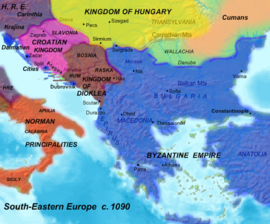From our Correspondent in Eastern Byzantium
Hellenistic dreams of a new Greece thwarted
Here in Western Byzantium, activists dreaming of a e been dealt a severe blow by Norman invaders.
"Many Normand riders have served as mercenaries in other armies, including the Byzantine and the Seljuks, and rulers as Pope of Old Rome. Very soon, motivated by the extortionate - marauding spirit of their ancestors, began campaigning against their neighboring and distant countries.
In 1017 AD recruited by the Lombards inhabitants of Italy to assist them in their wars against the Saracens. The country loved them so much that they decided to occupy it and settle there. The appearance of the Normans in southern Italy gave courage to Pope and strengthened the conquest plans. After an initial clash in which papal troops were defeated in the battle of Sivitate in 1053 and the pope himself was captured, then allied with them and blessed their work. They were encouraged to turn against the Byzantine provinces, and in every way, moral and material, helped them in achieving their goals.
The - now legitimized - Norman invaders, are now beginning to attacking southern Italy Byzantine cities. Strengthen the various rebels against the emperor and post one by one the Italian country from Byzantium. With the leadership of Robert Guiscard (Robert Guiscard) and with the help of the brothers Wilhelm and Voimoundos fight systematically against the Byzantines in the region. Istanbul reacts with an expeditionary force under George Maniakes, but eventually it revoked without result. In 1059 AD they conquered Apulia, then Calabria in 1060 and subsequently (1068 AD) Bari. With the capture of this city on April 6, 1071, the Byzantine rule finally ended the Great Greece (Magna Grecia). Furthermore, since 1061 Robert's brother, Roger (Roger Guiscard) besieged the SYRRAKOUSES and by 1072 all of Sicily passed into Norman hands. Roger B ', son of Roger A', brought the legacy of his father and his uncle and was crowned king of Sicily in 1130 thus became the first ruler of the united kingdom of southern Italy.
For Byzantium the appearance of the Normands in the Mediterranean was a major shock. At a time particularly critical for the Empire, the concurrenappearance of the Turks on the eastern border and the Normands in the West had serious consequences. The conquering momentum of Robert Guiscard was not limited to the occupation of Italy; his aim was to conquer the Byzantine Empire and the first step towards the realization of this objective was the capture of Corfu and Epirus coasts."
Athanasia Zafeiropoulou our correspndent in Byzantium
Serbia in 11th century
In the 990s, Jovan Vladimir rose as the most powerful Serbian noble, carving out a principality centered on the coast of modern Montenegro. This state became known as Duklja, after the ancient Roman town of Doclea. However, by 997, it had been conquered and made subject to Bulgaria again by tsar Samuel. When the Byzantines finally defeated the Bulgarians, they regained control over most of the Balkans for the first time in four centuries. Serbian lands were governed by a strategos presiding over the Theme of Sirmium. However, local Serbian princes continued to reign as suzerains to the Byzantines, maintaining total autonomy over their lands, such as the zhupanate of Rascia while only nominally being Byzantine vassals. Forts were maintained in Belgrade, Sirmium, Nis and Branicevo. These were, for the most part, in the hands of local nobility, which often revolted against Byzantine rule.
High Middle Ages
Emergance and fall of Duklja under the Vojislavljević

1090 A.D. The zenith of Dukljan power
For the next 150 years, the mantle of leadership of the Serbs passed to the coastal areas, where the principality of Duklja had arisen. The dynasty began by prince Stefan Vojislav created a powerful and influential state that took all Serbian lands from under the Byzantine rule. During this time, we know very little about the events in Serbia Zagorje (inland), because Byzantine attention was focused primarily on the coastal Serbs.Duklja was also the first Serbian kingdom, which gained international recognition. Prince Mihajlo received the king's crown from the Pope in 1077. His successor king Bodin enlarged the domain, but the Kingdom of Duklja didn't last for a long time. Byzantine Empire conquers Duklja in 1101.
We have used articles from Wikipedia, but could not find anything about year 1066.